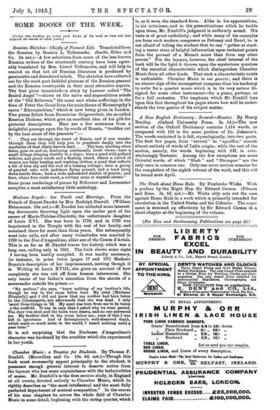Chamber Music : a Treatise for Students. By Thomas F.
DunbilL (Macmillan and Co. 10s. 6d. net.)—Though this book must necessarily appeal principally to the student, it possesses enough general interest to deserve notice from the layman who has some acquaintance with the teehnicalities of music. Mr. Dunhill's is the first serious study, in England at all events, devoted entirely to Chamber Music, which he rightly describes as "the most intellectual and the most fully perfected department of musical composition." In the course of his nine chapters he covers the whole field of Chamber Music in some detail, beginning with the string quartet, which is, as it were, the standard form. Alike in his appreciations, in his criticisms, and in the generalizations which he builds upon these, Mr. Dunhill's judgment is uniformly sound. His taste is of great catholicity; and while many of his examples are from such modern composers as Debussy and Ravel, he is not afraid of telling the student that he can " gather at start- ing a vaster store of helpful information upon technical points from the perusal of a Mozart score than from any other source." For the layman, however, the chief interest of the book will be the light it throws upon the mysterious question of the essential characteristic which distinguishes Chamber Music from all other kinds. That such a characteristic exists is undeniable. Chamber Music is sui gentris ; and there is no clearer sign of the incompetent composer than his tendency to write for a quartet music which is in its very nature de- signed for some other instrument—for a piano, perhaps, or for a full orchestra. The emphasis which Mr. Dunhill lays upon this fact throughout his pages shows how well he under- stands the true genius of his subject matter.


















































 Previous page
Previous page